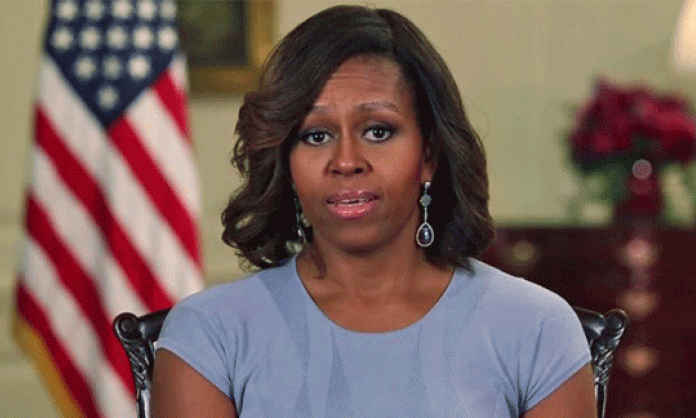The kidnapping of nearly 300 young women and schoolgirls, and the threat by the Nigerian separatist group Boko Haram to sell them into slavery, has many in the West asking “What can we do?” Unfortunately, the answer is “nothing”.
Jumoke Balogun summed up why in an article posted at CompareAfrique.com:
“You can’t do anything about the girls missing in Nigeria … [U]rging American power, specifically American military power, to address this issue will ultimately hurt the people of Nigeria … [W]hen you champion military intervention, you become part of a much larger problem. You become a complicit participant in a military expansionist agenda on the continent of Africa ... [T]he US military loves your hashtags, because it gives them legitimacy.”
That is a real problem. Michelle Obama has leapt to the front of what has become a worldwide #BringBackOurGirls campaign for military intervention in the oil-rich country.
She joins other “first ladies” Laura Bush and Cherie Blair, who justified the 2001 war in Afghanistan as a means of liberating Afghan women. Thirteen years and innumerable Afghan deaths later, it is still one of the worst places on earth for women to live.
Replicating the crusading zeal of the Kony 2012 campaign, #BringBackOurGirls is using Boko Haram’s horrible actions as justification for backing the violent and corrupt Nigerian government, which will further impress the US’s footprint on the neck of Africans. It’s the “missionary industrial complex” beloved of white saviours of the Bono and Geldof variety.
The attempt to garner support for another front in the imperialist “war on terror” is well-timed. Since the US’s Africa Command was set up in 2008 the number of exercises under its control has leapt from 172 to 564 in 2013, all of them justified by “the fight against extremism and the enemies that threaten peace, stability and regional security”.
There is international imperialist competition over the countries of Africa to see who can loot the most. Humanitarian justification for increased military intervention is a valuable tool in that competition.
The Nigerian government has presided over economic hardship, rising inequality and gross corruption – all this despite the country’s vast wealth.
None of the human cost was noteworthy at the World Economic Forum in Nigeria’s capital, Abuja, at the start of May – 900 international bankers, government officials and other leeches meeting to further the interests of economic plunder. Instead, president Goodluck Jonathan praised them, predictably, for their “moral support in the fight against terror”.
The reality is that the conditions of Nigerian and world capitalism are terrorism. The reason most Nigerian girls (and boys) lack education is not abduction by Boko Haram but the state’s lack of provision of it. While half of the 10 fastest growing economies in the world are in Africa, health and education indicators are the lowest on the planet.
There are struggles going on in Nigeria. The trade unions have a history of general strikes, and huge numbers of people have demonstrated against the government’s failure to even look for the abducted girls, indicative of their wider indifference to the fate of the mass of Nigerians.
#BringBackOurGirls substitutes calling for Western military intervention for solidarity with these struggles against the very forces that intervention would prop up.





